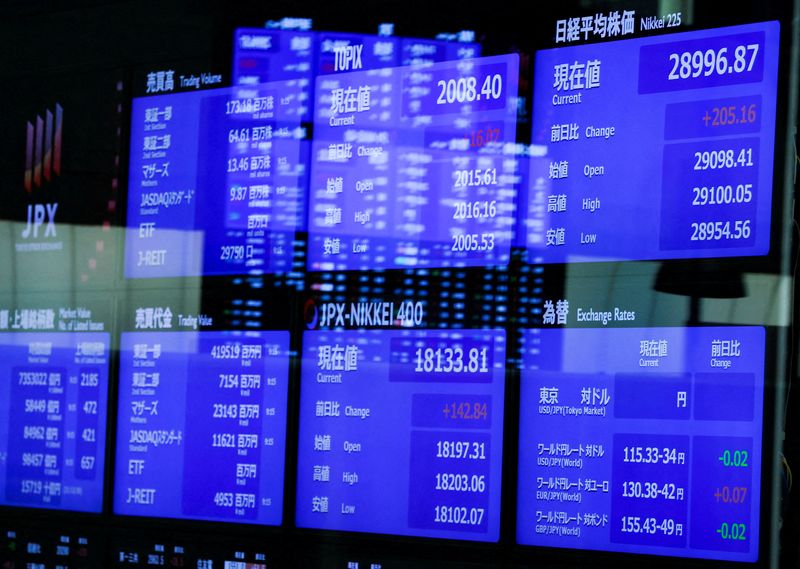
[ad_1]

© Reuters. FILE PHOTO: Monitors displaying the inventory index costs and Japanese yen change fee in opposition to the U.S. greenback are seen on the Tokyo Stock Exchange in Tokyo, Japan January 4, 2022. REUTERS/Issei Kato/File Photo
By Dhara Ranasinghe
LONDON (Reuters) -Renewed unease gripped world markets on Wednesday as information that Credit Suisse’s largest investor mentioned it couldn’t present the Swiss financial institution with extra monetary help despatched its shares and broader European shares sliding as soon as extra.
Signs of calm and stability in banking shares, which have tanked previously week, following the collapse of Silicon Valley Bank (SVB), quickly paved means for renewed promoting as Credit Suisse shares fell to report lows.
Europe’s financial institution index has now seen greater than 120 billion euros evaporate ($127.08 billion) in since March 8. The index was final down 6.4% at 1154 GMT. This dragged decrease European shares 2.4%
Investors rushed again into safe-havens, with two-year German bond yields down over 30 foundation factors at 2.60%. Two-year treasury yield have tumbled 98 foundation factors within the final 5 days, the most important drop because the week of Black Monday on October 19, 1987.
“The Credit Suisse share price is falling and government bonds are rallying on the back of that. Still very much driven by the perceived health of the banking sector, but this time in Europe,” mentioned Antoine Bouvet, senior charges strategist at ING.
The European Central Bank continues to be leaning in the direction of a half-percentage-point fee hike on Thursday, regardless of turmoil within the banking sector, given excessive inflation, a supply near its Governing Council informed Reuters.
Markets are “spooked” by Credit Suisse headlines, mentioned Richard McGuire, head of charges technique at Rabobank in London.
This has brought about the share value fall and the surge in brief dated German bonds however he didn’t suppose this is able to have an effect on central financial institution determination making.
“For today Credit Suisse is the dish of the day but we don’t think this will be a longer lasting trend,” he mentioned.
MSCI’s broadest index of Asia-Pacific shares outdoors Japan rose 0.6%, having slid 1.7% on Tuesday. index was flat whereas an index of Japanese banks, which has slid 8% this week, jumped over 3%.
But U.S. fairness futures fell sharply as European banking shares tumbled in an ominous signal for the Wall Street open. U.S. inventory futures fell by 1.6% at 1155 GMT.
Bruised U.S. financial institution shares regained some floor on Tuesday aided by information that non-public fairness and buyout giants had been trying to scoop up a few of SVB’s property. That left buyers hopeful that efforts to shore up confidence would avert a wider monetary disaster.
BACK TO CENTRAL BANKS
Data on Tuesday confirmed U.S. client costs rose 0.4%, with a year-on-year achieve of 6% – in keeping with analyst expectations. There had been worries that stronger-than-expected knowledge may lead the Fed to go for jumbo-sized hikes to battle inflation.
As just lately as final week, markets had been braced for the return of enormous Fed rate of interest rises however the swift collapse of SVB has modified these expectations, with markets pricing in an 80% likelihood of a 25 foundation level hike subsequent week.
Also serving to enhance sentiment was knowledge displaying China’s financial exercise picked up within the first two months of the yr, pushed by consumption and infrastructure funding, and indicators the beleaguered property sector is beginning to get better.
In Europe, the place markets had additionally quickly dialled again ECB rate-hike bets at the beginning of the week, merchants had been betting once more on a giant enhance in euro zone borrowing prices on Thursday.
According to a Reuters report, a supply near the ECB Governing Council mentioned the central financial institution was unlikely to ditch plans for a giant fee transfer this week as a result of that will harm its credibility.
“The ECB is behind (the U.S. Federal Reserve) in terms of a tightening cycle and has a lot to do,” mentioned Jorge Garayo, senior charges and inflation strategist at Societe Generale (OTC:).
“Core inflation,” he added, “is still at very, very elevated levels. So we will be very surprised to not see 50 basis points delivered by the ECB.”
In forex markets, the , which measures the U.S. forex in opposition to six rivals, was up 0.9% at 104.67, with the euro down 1.4% at $1.0580.
Oil costs trimmed robust features and had been each final down 1.5% with Crude buying and selling at $76.22 and Light Crude at 70.23.
($1 = 0.9443 euros)
[adinserter block=”4″]
[ad_2]
Source link